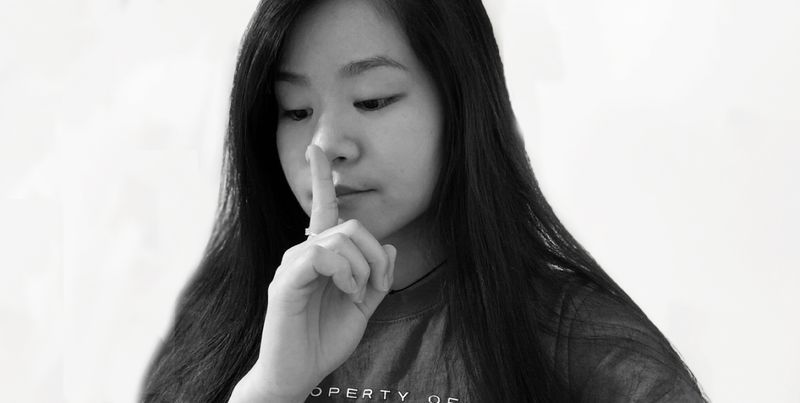We Are America
My Fear of an "S"
By Angelina

North Quincy High School, Massachusetts
when I was younger, I had a lisp. A lisp is a speech impediment where the letter “s” is mispronounced as a “th” sound. I lost my two front baby teeth around the same time, and as a result, I developed a lisp.
At the time I didn’t know what a lisp was. It was first mentioned in 5th grade. My teacher asked a question and I offered the answer. After, my teacher asked if I had a lisp. I was confused and didn’t know how to answer. Then she asked “Can you pronounce the words snake and sick?” After I pronounced them, she nodded and said “You definitely have a lisp.” While I didn’t know what she was talking about, I did know that it wasn’t a good thing. I thought I talked normally and sounded like everyone else. I was oblivious to my lisp.
One day, I took a video of myself talking. I didn’t like it at all. I felt different and hated my voice. It completely changed my perception of myself and how others would view me. It made me wonder why nobody told me about it sooner. Did everyone notice but not tell me? Was it weird to hear? Did people laugh at me behind my back?
When middle school began, I became shyer and didn’t want to risk exposing my lisp. I felt even more insecure when we had to read out loud in class. I felt embarrassed even though I loved reading. My speech became a hindrance to my self-confidence. I began avoiding all words that contained the letter s. Nobody overtly made fun of me, but I knew my peers heard my lisp based on the looks on their faces; I knew they were internally judging me.
People underestimate the power of speech. Talking is so important in so many ways: It’s used to communicate with people. It’s something you do every single day, and suddenly, I just couldn’t bring myself to speak the words that were in my mind. After school, I would scour the internet for how to get rid of a lisp. I read that getting rid of a lisp is much harder when you’re older, and that speech therapy may be the only solution. I didn’t want to go through the trouble of therapy, so I was determined to remedy the lisp myself. While I knew it wasn’t the end of the world if I had a lisp, I also knew I would feel a lot more confident in myself if it was corrected. Every day I would practice, but It wasn’t an easy task.
All I wanted was to feel comfortable hearing my own voice. It was frustrating having to work on something that came so easily to everyone else. However, at the end of 6th grade, after spending many hours practicing, I eventually got the hang of it. It felt good knowing that the time I devoted to myself paid off and that I finally broke a bad habit.
I also realized that even if I wasn’t able to correct my lisp, I shouldn’t have felt ashamed. If you feel self-conscious about something, you can either accept it or change it. Even today I have a little apprehension when I read a word with an “s” in it, feeling fearful that the lisp will return. It’s also funny that it’s called a lisp - people with a lisp wouldn’t be able to say it right. Throughout my childhood, speech and language had a huge impact on me. It affected me socially and academically, but I learned it didn’t define me. Because my lisp was slight, and I was able to dedicate time and practice, I was able to overcome it. Overcoming this obstacle made me the person I am, and I’m happy to have fixed my lisp.
© Angelina. All rights reserved. If you are interested in quoting this story, contact the national team and we can put you in touch with the author’s teacher.